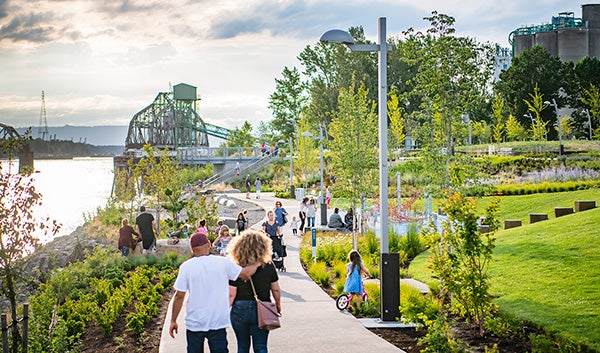Pollution Prevention for Businesses

Protecting precious resources
In 2022, the state updated business environmental protection requirements to better protect the water resources we all share and rely on. Our Water Resources Protection Ordinance outlines policies for pollution prevention and water protection to reflect these changes. We’ve dedicated extra resources to help impacted businesses adapt to and meet these requirements.
Free dangerous waste disposal: drop-off or pick-up service option
Waste Incentive Network
Small businesses and property owners who generate dangerous waste are required by law to track and dispose of it safely.
The City’s Waste Incentive Network (WIN) offers businesses or property managers/owners a free, one-time self-haul or drop-off disposal service with CleanEarth or WasteXpress.
To qualify, businesses must be within Vancouver City limits, have dangerous waste stored on site and meet the criteria for a small quantity generator (SQG). SQG’s are those businesses that generate less than 220 pounds of dangerous waste per month.
Reduce your business liability, protect employees and get rid of old stockpiled disinfectants, fertilizers, paints, paint thinners, solvents, acetone and any unused or unwanted chemicals.
Qualifying dangerous waste
- Spent antifreeze
- Full or partially full aerosol cans
- Fluorescent lights
- Asbestos
- Full or partially full paints, solvents, thinners, containers of antifreeze or used oil
- Various batteries or equipment with encapsulated batteries
- Used shop towels, oily or greasy rags
- Acetone, unused nail polish or polish removers
- Miscellaneous containers with unidentified chemicals or liquid wastes presumed to be hazardous
How to participate
Qualifying businesses can choose between a one-time pick-up or drop-off appointment.
Drop-off appointment
Set up a drop-off appointment on the CleanEarth website. Appointments can be scheduled 8 a.m. to 4 p.m., Monday through Friday.
Drop off your waste at CleanEarth, 625 South 32nd St., Washougal, WA 98671, at your scheduled appointment time. Standard household hazardous waste can be dropped off using this service. For other types of dangerous waste materials, contact CleanEarth at 360-835-8594.
Pick-up appointment
Set up a pick-up appointment by calling WasteXpress at 360-369-4920 or visiting the WasteExpress website to fill out the appointment request form.
A message from our funder: This project has been funded wholly or in part by the United States Environmental Protection Agency (EPA) under assistance agreement RB02J13301 to the City of Vancouver. The contents of this page do not necessarily reflect the views and policies of the EPA, nor does the EPA endorse trade names or recommend the use of commercial products mentioned here.
Prevent pollution at work
Pollution sources
Pollution from business operations can harm our local creeks, streams and groundwater. For example:
- Runoff from improper chemical and hazardous material storage can infiltrate groundwater and local waterways.
- Leaks and spills from vehicles and business operations can seep into soil or storm drains.
- Outdoor washing or cleaning can send suds and other contaminants through our watersheds and into lakes and ponds, degrading our natural environment.
Best practices
To guard against pollution, businesses need to follow best management practices such as:
- Clean and maintain your storm drains, filters, swales or other stormwater facilities.
- Store your materials indoors or inside a containment tub with a cover.
- Dispose of waste properly. Take advantage of our Pilot Waste Incentive Network for dangerous waste disposal.
- Train your team on best management practices so they know how to prevent leaks, spills and other risks of contamination.
- Reduce your use of reliance on harmful substances.
Other resources
If you have a new business or want to learn more about pollution source control requirements, visit the Stormwater Management Manual for Western Washington, Volume 4 Source Control BMP Library.
Check out the Clark County Green Business Program to learn more about how you can prevent pollution, create a healthier workplace for your staff and get recognized for environmental excellence.
Hands-on Assistance for small businesses
Pollution prevention partnership
The Pollution Prevention Partnership provides free hands-on assistance to Small Quantity Generators (typically small businesses and organizations) who wish to improve and reduce their impacts to human health and the environment.
Through the Partnership, we offer technical assistance visits to help you identify, reduce and eliminate hazardous waste pollutants at their source. A local pollution prevention specialist meets with your team to learn about your business activities and practices. They work with you on any concerns, solutions and problem-points, then help you solve common challenges around dangerous wastes, stormwater management, solid waste and spill prevention.
Our collaborative process limits your liability, reduces overall risk and improves your work environment.
How to participate
Email citywaterprotection@cityofvancouver.us to set up a visit.
Frequently Asked Questions
Why should a small business be concerned with pollution?
Protecting contamination and pollutants from reaching our local water supply isn’t just the right thing to do, it’s required by law! Protecting water is good for our health, environment and local economy.
What is dangerous waste?
Washington state uses the term “dangerous waste” rather than the federal law’s term of “hazardous waste.” This is because Washington state’s Dangerous Waste Regulations are more protective than federal laws. The definition of “dangerous waste” is more expansive than “hazardous waste.”
If your business uses, stores or disposes of these materials, you probably generate hazardous waste. Product labels may also indicate if a material is a hazardous waste. Watch for labels such as: DANGER, FLAMMABLE, WARNING, POISON or CAUTION.
These types of materials should never be thrown in the garbage.
- Adhesives
- Antifreeze
- Amalgam waste
- Batteries
- Disinfectants
- Fertilizers
- Fluorescent lights
- Oil
- Paints and thinners
- Pesticides
- Pharmaceuticals
- Shop towels
- Solvents
- Other industry-specific wastes
What if I have more questions about pollution prevention at work?
Contact us at 360-487-7130 or citywaterprotection@cityofvancouver.us.

